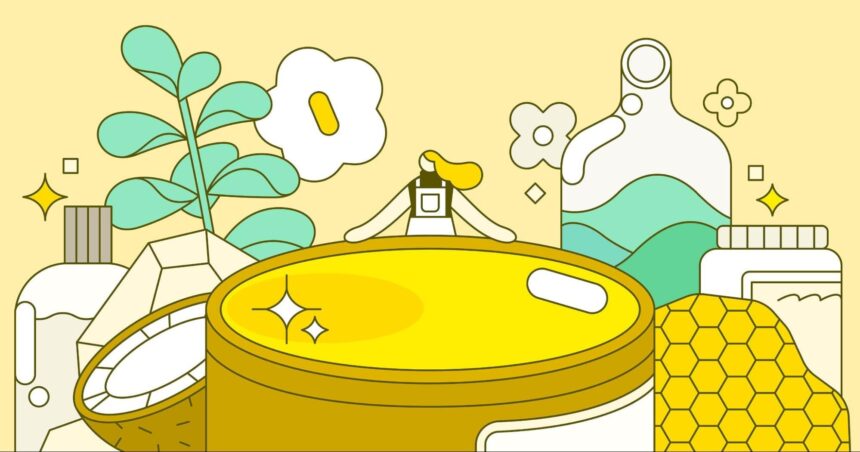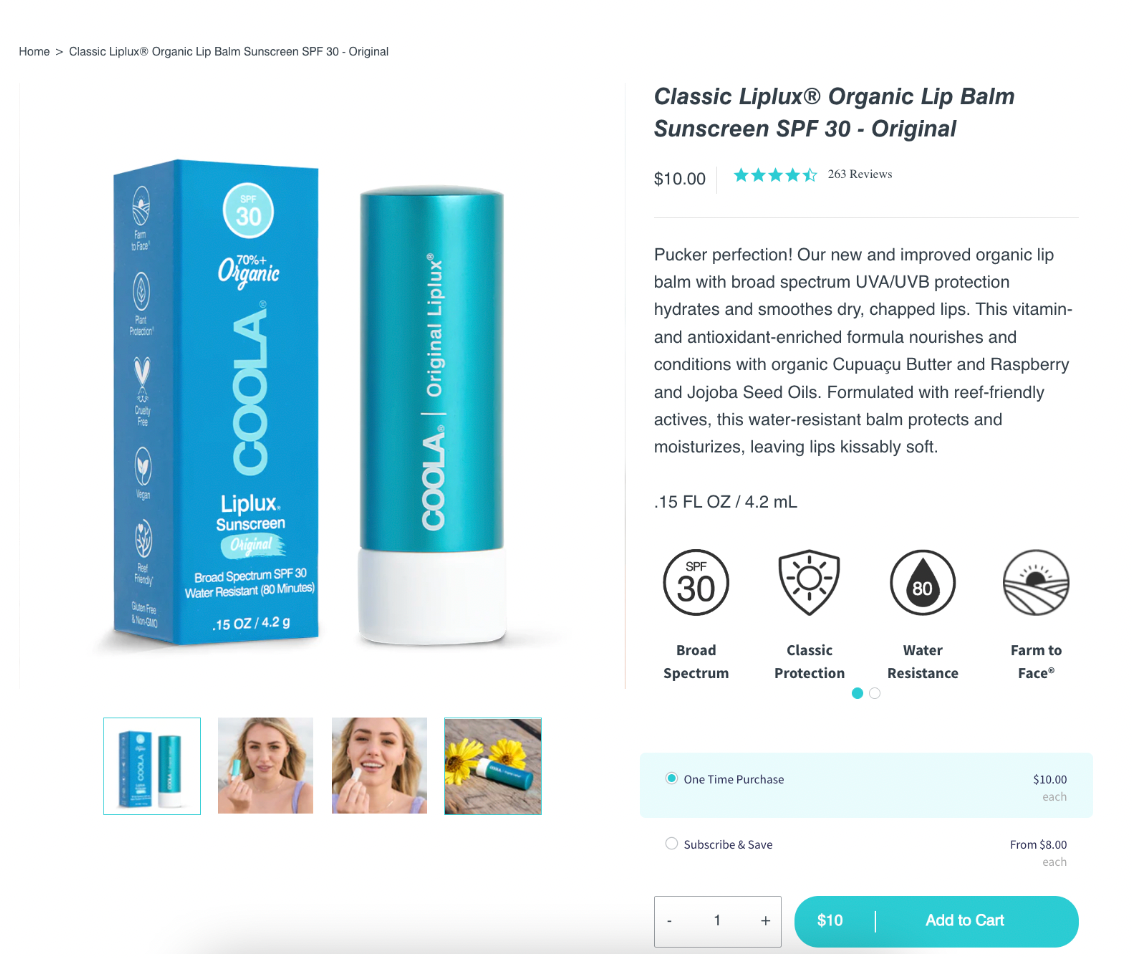Chapped lips are a universal problem—many of us use a balm or stick daily to keep our lips soft and smooth. While lip balm may not be something you’d immediately consider when looking for a business opportunity, the growing interest in natural lip care makes this necessity a viable product idea.
Yes, believe it or not, learning how to make lip balm is a marketable skill. Avid DIYers (do it yourself) who concoct all sorts of creative projects can take that passion and channel it into a side business. DIY lip balm is a great product for fledgling entrepreneurs on the prowl for a new idea to build a business around.
It’s easy to take the below recipe and customize it to create your own lip balm to market. Because the ingredients are relatively inexpensive and it’s simple to make in your own kitchen, homemade lip balm is a viable way to turn a creative passion into a product.
Why sell homemade lip balm?
Homemade lip balm has become an essential lip product for consumers. Mordor Intelligence estimates the global lip care market at $4.52 billion in 2024, with a predicted 4.9% compounded growth rate each year through 2029.
The market research company also reports an increase in awareness regarding personal care products, especially those containing natural ingredients. Rising lip care issues, such as chapping, splitting, and wrinkles, is estimated to further propel the demand for lip balm, especially among millennials. And an increasing amount of men are becoming interested in lip care products.
Lip balm is for everyone. Whether you use it daily or carry it around for when your lips are dry, it’s a helpful product for consumers. In fact, 81% of women and 39% of men use lip products daily, with women averaging about 2.35 times per day—some up to 14 times in a day.
Google Trends shows consistent interest in lip balm over the past five years. Consumers tend to search for lip balm most in the fall and winter months. You’ll notice the uptrend in interest begins mid-October and finishes around March. This gives lip care retailers a nice seven-month window to push sales before summer.
Since lip balm has a universal purpose, it can be sold anywhere, making it one of the best crafts to make and sell. Searches for lip balm expand across the globe, including Singapore, Indonesia, the United Kingdom, New Zealand, and Australia.
So if you’re an entrepreneur looking for a new product to sell, lip balm is a solid option for you. A lip balm business offers numerous benefits, including:
- Low cost to make. Making lip balm doesn’t require pricey materials. Some sources say DIY lip balm costs around 12¢ per tube.
- Global interest. Balm and other lip care products have no boundaries. There is clear interest around the world. It’s also an easy product to ship.
- Easy DIY craft to learn. Lip balm recipes are easy to follow. As you’ll see in the formula below, it’s a simple process.
- Easy to customize.With so many different bases and scents, it’s easy to personalize lip care products and differentiate yourself from competitors.
Creating lip balm is a skill you can turn into a nice side income. You may not find it profitable to start a lip balm business on its own, because the profit margins are low. But you can easily expand into different body and skin care products.
Many brands, like Meow Meow Tweet, take this route to create a more sustainable lifestyle. It offers lip balm, like the Coconut Cacao vegan balm below, alongside a mix of complementary face care products.

Regardless, it’s clear that lip balm can be a profitable venture when done right. It’s a good creative outlet, because you can produce any type of lip balm possible. And you can easily expand into other product categories if you want to grow beyond lip balm.
Types of homemade lip balm
Now that we’ve established that natural lip balm offers enough demand and sales to potentially support a new homemade lip balm line, let’s examine the various types of lip balm you can try recreating.
While there are numerous types of natural lip balm, here are some of the most popular and pervasive types on shelves today.
Beeswax lip balm

When it comes to choosing natural ingredients for the base of your lip balm, one of the go-to substances to use is beeswax. After all, one of the most popular brands of natural lip balm—Burt’s Bees—is created from beeswax.
Beeswax pellets are also easy to order, mix well with other lip balm ingredients, and are relatively inexpensive (you can order one pound of beeswax pearls/pastilles for around $9).

Tinted lip balms

While natural lip balm is generally used to treat or prevent chapped lips, plenty of us also like to add a pop of color to our mouths while we’re at it.
As such, there are a variety of tinted lip balms in innumerable colors. From pinks, oranges, purples, reds, and everything in between, you can create plenty of custom shades using either a small amount of lipstick mixed in with your recipe or mica powder in your preferred pigment.
Medicated lip balms
To soothe chapped or dry lips, many natural lip balm varieties include ingredients to alleviate pain from cracked skin. The most common ingredients include menthol or camphor, which ease dry lip pain.
Homemade lip balm creators can also include a variety of essential oils in their recipe to add other healing qualities, such as lavender for stress relief.
If you are selling medicated lip balm, you’ll want to read the Food and Drug Administration’s (FDA) regulations for cosmetics packaging and labeling. Cosmetics are regulated by the FDA, which is strict with how you can package and market lip balm products. You don’t want to get fined for not complying with the law when starting your lip balm business.
CBD lip balms

Cannabidiol (CBD) is one of the cannabinoids found in cannabis plants. Unlike tetrahydrocannabinol (THC), CBD doesn’t give you a “high.” But it does have therapeutic effects that benefit the skin, like moisturizing dry and chapped lips.
CBD isn’t the base of the lip balm. It’s often mixed with other ingredients, like kokum butter, beeswax, coconut oil, almond oil, olive oil, avocado oil, castor oil, and hempseed oil to create the final product. If you choose to produce CBD-infused lip balm, look for the following indicators of safety and quality:
- Made with US-grown hemp
- Free of pesticides, heavy metals, and molds
- Contains no more than 0.3% THC
- Made by a company that provides proof of third-party testing by an ISO17025-compliant lab
Vegan lip balms
Vegan lip balms use no animal byproducts in their formulas. They cater to consumers who do not eat or use food and other products derived from animals, be it by preference or for medical reasons.
These lip balms use ingredients like coconut oil, sunflower oil, cocoa butter, vitamin E, jojoba oil, and calendula flower extract to hydrate and protect the lips. They can even come medicated with SPF to protect lips from sun and wind damage.
Take Hurraw! Balm, for example. The brand makes vegan, raw, organic, and fair trade balms. It features tinted balms, ayurvedic and medicated balms, and classic styles using all-natural ingredients.

SPF lip balms
SPF lip balms offer some sort of sun protection. They may include ingredients like carrot seed essential oil, red raspberry seed oil, coconut oil, beeswax, shea butter, and zinc oxide—each of which has its own SPF benefits.
It’s important to note, however, products that claim to have SPF may require additional licensing or certification from the FDA. You’ll want to ensure you refrain from claiming protection from skin cancer and skin aging unless you have your products tested by a certified and approved lab.
How to make and sell lip balm online
While there are many varieties of homemade lip balm, we’re offering a DIY lip balm recipe here for you to customize. Change out the beeswax base, use your preferred essential oils, or add color for a tint to personalize the following recipe for your own purposes.
Gather your ingredients and tools

Before getting started, you’ll need to assemble all your ingredients and tools including:
- Beeswax: 2 tbsp. You can purchase beeswax in pearl or pastille form from local farmers markets or online sellers like Bulk Apothecary.
- Shea butter: 2 tbsp. Procure some creamy, raw shea butter for your balm base from Bulk Apothecary or Amazon.
- Coconut oil: 2 tbsp. Buy this common ingredient from your local grocery store, a bulk-buying retail store like Costco, or Amazon.
- Essential oils: several drops. Whatever scent you prefer for your homemade lip balm, you can find a variety of essential oils at most discount stores (think Walmart or Target), health and wellness stores, or online from Amazon. Popular essential oils for lip balm include peppermint, lavender, lemon, vanilla, and grapefruit.
- Mica powder: 1/2 tsp. To give your homemade lip balm a rosy tint, purchase mica powder from Amazon, or Bulk Apothecary.
- Lip balm containers. Find a place that will sell containers for your homemade lip products, whether you prefer lip balm tubes, jars, or tins.
- Plastic pipette. To help fill your containers without spilling. You can use a lip balm filling tray as an alterantive.
- Double boiler. To slowly melt your ingredients together.
- Spatula or wooden spoon. For mixing your ingredients together.
Combine ingredients

1. Take the beeswax, shea butter, and coconut oil and put them in the top pot of a double boiler.
2. Add tap water to the bottom pot. Place the double boiler on your stove, and turn the heat to medium high. Once all the ingredients begin to melt in the pot, use a spatula or wooden spoon to stir and combine.
Add your scent

3. Once all the base ingredients are melted and well combined, remove the double boiler from the direct heat. Keep the top pot above the bottom pot containing the water to maintain the temperature of the ingredients (and to prevent the melted balm base from hardening).
4. After the double boiler is removed from the direct heat, begin adding a few drops of your favorite essential oil to the mix. Mix in five to 10 drops to start, then test the scent. Add more essential oil based on your preference.
Add your lip balm color

5. Now you’ve added your scent of choice, it’s time to add a pop of color to your lip balm mixture. From here, add a pinch of mica powder or a pinch of lipstick to the balm base. Stir to combine the color into the mix. Slowly add more powder or lipstick to darken the color of the mixture to your preference.
6. Once the mixture is combined, spoon the balm into a pipette or dropper.
Finish off your homemade lip balm

7. Once the balm mixture is in your pipette or dropper, transfer the balm into your tins or chapstick tubes. Allow them to cool off at room temperature for several hours.
8. After the balm has cooled to room temperature, you’re ready to sell your newly created tinted lip balm!
How to start a lip balm business
Now that you know how to make lip balm, let’s look at how you can start running a business selling it.
1. Research the market
A successful lip balm business won’t succeed just from hard work. Think about a niche in the market that isn’t being filled or a target market you want to reach with your products. This will attract customers interested in buying your products.
Some ideas:
- Classic lip balm, These are the balms that you carry around and reapply throughout the day. Burt’s Bees or ChapStick will be your competitors.
- Organic and sustainable. These are for the eco-friendly buyers. They are often also vegan and cruelty-free. Vegan cosmetics are expected to represent a $20.8 billion industry by 2025.
- Luxury. These balms target high-end customers and are typically shared on social media. They use premium, natural ingredients and are higher priced. Competitors include Dior, YSL, La Mer, etc.
When doing market research, consider what other products you could offer alongside lip balm. It’s very rare for a business to succeed selling lip balm alone. Brands often sell other body or skin care products like scrubs, lotions, soaps, etc.
SUGAR Cosmetics, for example, sells lip balm, but also lip scrubs, makeup, lip gloss, and other related things that can be made and sold online.

You can upsell customers based on past lip balms they buy, create scent-centric bundle packages, and reach new audiences by expanding your product line.
Learn more: How to Start a Makeup Brand Online
2. Choose a catchy lip balm business name
If it looks like you found a target market and good products to sell, you’re ready to start planning your brand. This means choosing a business name and logo—both of which will ideally go on your lip balm packaging. Customers like brands with a captivating story, so tying that into your name and logo will help attract attention.
3. Write a business plan
A business plan guides your entire journey as a lip balm maker and business owner. It helps you properly analyze your competitors so you can stand out in the market, understand what your target audience is looking for, and build a solid plan for promoting your new business.
When writing a business plan, ask yourself: What’s the goal for my products? Do I want to be a brand name sold in stores like Anthropolgie? Or do I want to create a white label or private label brand for big stores like Target or Walmart? Do I want to be a premium brand sold only in my retail and online store?
Determine your goal and keep it in mind as you create your brand.
Before you write your business plan, read through the following business plan example. You can download a copy in Microsoft Word or Google Docs and use it to inspire your own planning.
4. Consider legal requirements
Do some due diligence around manufacturing and packaging practices. Depending on where you operate the business, you’ll need to comply with local health and safety standards before selling homemade lip balm to the public. You may want to look into any business licenses you’ll need to sell in your region.
If you’re selling in the United States, a good place to start is the FDA’s Small Business & Homemade Cosmetics Fact Sheet. If you’re selling in Europe or the United Kingdom, read the European Commission’s cosmetics regulations guide.
5. Start marketing your homemade lip balm business
Now that you have the instructions for your very own homemade lip balm recipe, you can start turning your new product into a business. And one of the primary channels where you can find an audience of potential customers for your DIY lip balm is online.
Online
While there are a multitude of digital channels you can explore for your homemade lip balm, one of the first steps to building an online presence is to build your own online store. You then have a digital home to display your handcrafted products—and a central place to drive all the traffic you might drum up on other channels.
While an online store is a good place to get started with marketing your homemade lip balm online, there are other channels you should explore, including:
- Instagram. Create beautiful images of your products to share with followers, connect with potential brand evangelists to build an influencer marketing strategy, and offer behind-the-scenes peeks of how you make and use your DIY lip balm.
- Pinterest. There’s certainly no shortage of beauty and cosmetic products on Pinterest. As another visual social media platform, Pinterest is a fantastic place to boost discoverability. Creating beautiful pinned images can help you find new customers.
- Giveaways and contests. Many retailers have built successful strategies around giveaways and contests. They offer the opportunity to increase your customer base, introduce your products to new customers, and grow your business as a result.
- Email marketing. Deliver news, promotions, and product launch details right to your customer’s inboxes. Create email marketing campaigns to increase return buyers, offer personalized product recommendations, and increase buyer loyalty.
With a lip balm brand, you’re going to put a heavy emphasis on your visual marketing, which is why platforms like Instagram and Pinterest will be so powerful.
In-person
While many retailers may start out making money online, don’t discount in-person sales. To reach new audiences and experiment with new products and income streams, consider setting up face-to-face sales opportunities with your customers.
Homemade lip balm, either as a standalone product or as part of a line of beauty products, can be packaged up and presented beautifully for in-person sales. Whether you prefer to set up a market booth at local craft fairs or attend flea and farmers markets, DIY lip balm creators have a wealth of opportunities to take advantage of in-person sales.
Or, if you prefer to dabble in temporary retail, you can try running your own pop-up shop, or a “pop-in” shop at a beauty or cosmetics store.
At these events, not only can you make face-to-face connections with retail customers, you can also chat with potential wholesale customers.
If that isn’t enough, there are a wealth of other reasons homemade lip balm makers should consider in-person sales:
- Befriending fellow entrepreneurs and crafters. Connecting with your customers may be priority No. 1, but meeting other entrepreneurs is another major benefit. You can get inspiration or new ideas for products and marketing tactics.
- Find wholesale customers. In-person sales afford retailers the opportunity to find potential wholesalers, giving you the chance to get your homemade lip balm into stores and in front of their built-in customer base.
- Experimentation. One of the advantages in-person sales has is the ability to experiment and get immediate feedback. You can offer demonstrations, address customer queries then and there, and determine whether a new collection or marketing method is working.
- Build your email list and branded social channels. In-person interactions give you the chance to encourage customers to sign up for your email subscriber list and follow you on your social channels to get regular news and updates from your brand.
Doing a little due diligence can set yourself (and your bottom line) up for success. Check out our guide to nail the in-person selling experience, and do some homework on how mobile point-of-sale systems like Shopify POS can help you sell anywhere.
Building a successful lip balm business
Now that you’re well-versed in how to make lip balm to sell, you can start your very own side hustle. Scratch your creative itch by fashioning your own recipe, then use the above marketing tactics to get your homemade products in front of potential customers.
Soon you’ll start to see the benefits of running your own business selling lip balm and reap the rewards of a profitable business and higher revenue.
Lip balm business FAQ
Can you make money selling lip balm?
Yes, many brands make money selling lip balm online and in person. You’ll want to do market research to determine what types of balms are selling and who is buying them. Then create a unique product for that audience. Brands also extend their product line to other skin and body care products to attract more customers and increase sales.
How do I start a lip balm business?
Do market research. Build your brand. Create a lip balm business name. Write a business plan. Make lip balm to sell. Design lip balm labels. Build an online store. Market your lip balm.
How much does homemade lip balm sell for?
You can sell lip balm for as low as $1.50 per tube or container, or up to $10 for special variations. Try to keep your lip balm priced between $4 to $7 per tube to stay competitive. Offer bundle packs to increase average order value and sell more lip balm online.
Does lip balm need FDA approval?
Cosmetic products and ingredients do not need FDA premarket approval. So you can create lip balm and sell it without getting an OK from the government. However, the FDA can enforce action against products on the market that don’t comply with the laws mentioned in their guidelines.









